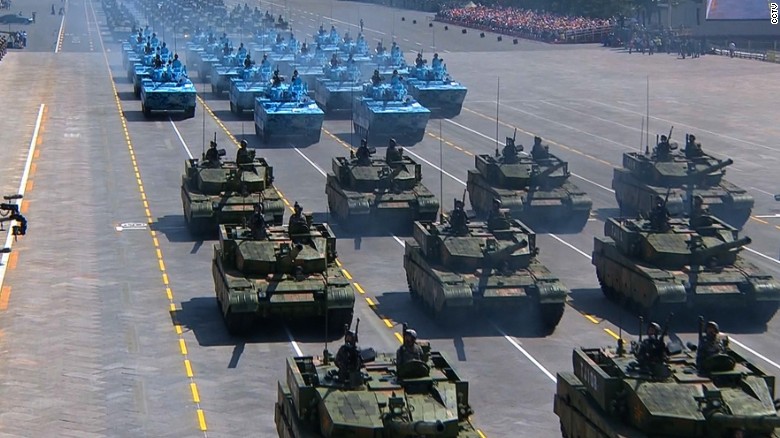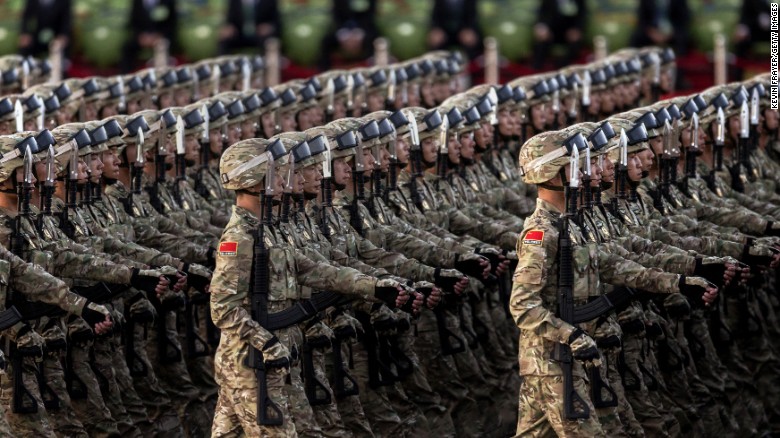The Peace Initiative...?
Spectators
look on as an electronic screen shows President Xi Jinping delivering a
speech at the start of the military parade marking the 70th anniversary
of the end of the second world war. Photo: Reuters
"War is like a mirror. Looking at it helps us better appreciate the value of peace. Today, peace and development have become the prevailing trend, but the world is far from tranquil. War is the sword of Damocles that still hangs over mankind. We must learn the lessons of history and dedicate ourselves to peace."
"In the interest of peace, we need to foster a keen sense of a global community of shared future. Prejudice, discrimination, hatred and war can only cause disaster and suffering, while mutual respect, equality, peaceful development and common prosperity represent the right path to take. All countries should jointly uphold the international order and system underpinned by the purposes and principles of the UN Charter, build a new type of international relations featuring win-win cooperation and advance the noble cause of global peace and development."
"In the interest of peace, China will remain committed to peaceful development. We Chinese love peace. No matter how much stronger it may become, China will never seek hegemony or expansion. It will never inflict its past suffering on any other nation. The Chinese people are resolved to pursue friendly relations with all other countries, uphold the outcomes of the Chinese People's War of Resistance Against Japanese Aggression and the World Anti-Fascist War, and make greater contribution to mankind."
Chinese President Xi Jinping, Beijing, 3 September 2015
 |
| President Xi Jinping with President Putin And South Korea's Park Geun-hye -- Reuters |
"For the last 30 years or more, China has been searching for an ideology that will bind the nation together after the failure of the Cultural Revolution. This is about the war as part of a binding national identity."
Rana Mitter, professor of Chinese history, Oxford University
"They are saying, Look, the U.S. may have delivered the coup de grace -- but ..."
"The war gets recast as the beginning of the wealth and power era for China, as a moment of transition from humiliation to rejuvenation."
John Delury, scholar of China and Korea, Yonsei University, Seoul
"In the experience of the Chinese Communist Party, the regime's power comes from guns. To hold on to the regime and his personal power and position, it is very important for [Xi] to have control over the armed forces."
Zhang Lifan, Chinese historian
"It's all about [the] Second World War, but it's also not about [the] Second World War at all."
"The military is going to love this, because they are going to feel how far they've come -- from the baggy-suited peasant army of 40 years ago to a very capable modern military today."
Susan Shirk, chair, 21st Century China Program, University of California, San Diego
 |
| CNN |
China's presumed sabre-rattling over its hugely expanded sovereign air space and its warning to its neighbours, the nervous leaders in the Philippines, South Korea, Vietnam, Australia, can rest easy. The release of thousands of doves in a touching demonstration of China's intentions should come as a great relief that all is well, and China's intentions have been hugely misunderstood. Tibet too can breathe a sigh of relief that it hasn't, as it has assumed, been an occupied nation since the turn of the last Century.
The symbolic message in the release of 70,000 doves seen in flight against a broad, blue sky is testament to China's sincerity. And who is prepared to question that? If the general secretary of the Communist Party of China, chairman of the Central Military Commission and President of the People's Republic of China cannot be trusted, then who can be? The twelve thousand troops standing by certainly trust him and were doubtless thrilled to be inspected by their leader during the "victory in the Chinese People's War Against Japanese Aggression".
 |
| CNN |
Patriotism is a potent medicine in knitting public opinion toward its leader, none too subtly directng it to vent its rage against its one-time occupier whose armies insulted, degraded and massacred millions of Chinese unable to shake loose the fetters of imperialistic brutality until the People's Liberation Army [definitely not the Nationalist Army of Chiang Kai-shek] cast off the shackles and freed China from Japanese occupation. It is a time to forget China's new economic fragility, a time to celebrate China's greatness.
Russian President Vladimir Putin and South Korean President Park Geun-hye were present along with dignitaries from 30 countries. Missing were the Allied powers' current leadership. Present also was unsavoury Sudanese President Omar Hassan al-Bashir, whose murderous exploits in Darfur earned him an accusation of war crimes by the International Criminal Court.
Labels: Aggression, China, Conflict, Japan, Second World War, Threats


<< Home